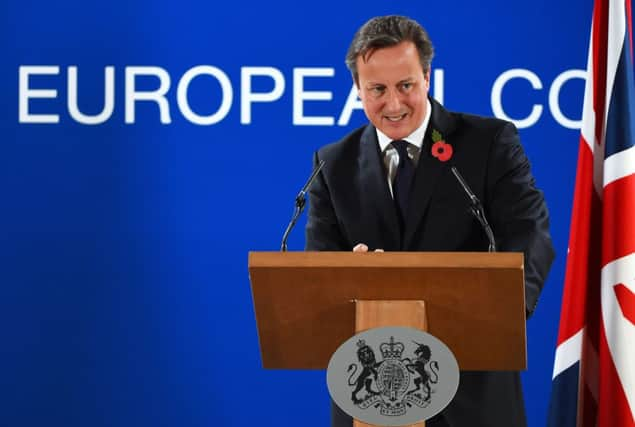Leaders: EU demonstrates daftness not deftness


Mr Cameron is outraged, particularly by the fact that he learned of it only on Thursday and there is little more than a month to go before the payment is supposed to be made. Whether Treasury officials knew of it a week or so ago is neither here nor there. The more important point is that EU officials have handled this in a way that – by accident or design – will damage Mr Cameron and shorten the odds on Britain leaving the EU.
Rules agreed some years ago are intended to make EU membership payments progressive – richer countries pay more than poorer ones. Part of this money is levied as a percentage of a country’s gross national income.
Advertisement
Hide AdAdvertisement
Hide AdUK National Statistics has been revising these figures and now it seems that Britain’s economy has done a bit better in recent years than was previously thought, particularly relative to Germany.
This is why Britain, plus the Netherlands and some others, is being asked to pay more while Germany, France and a few other states will get rebates. It all sounds very logical, however, the fact that those expected to pay more include Greece, whose weak economy is struggling under an EU-ordered austerity programme, and Cyprus, which has been hit by penalties for EU help with a bank bailout, suggests that the system is producing some bizarre results and needs tweaking.
But the EU’s political crassness is absolutely breathtaking. EU officials must surely have been aware that, by leaking this out on the eve of the summit that Mr Cameron was attending while Treasury officials were still trying to check the sums, the result could only be acute embarrassment for the British Prime Minister.
If so, it has backfired spectacularly, with Mr Cameron refusing to pay. Italy’s prime minister, also being asked to pay more despite struggling with a stagnating economy, has described the demand as a “lethal weapon” while the reaction of the Greeks doesn’t need much imagining.
EU officials must surely also know that Mr Cameron is under acute political pressure from Ukip which wants Britain to quit the EU, and that a general election which may be pivotal to continued British membership is due next May.
If they had wanted to hand Ukip’s Nigel Farage a set of trump cards, they could hardly have done a better job.
If EU officials want to engineer a Brexit, at least the UK knows where it stands.
But if they seriously want to help Mr Cameron keep Britain in the EU, they need to behave with more political deftness than this.
Driving home a vital message
Advertisement
Hide AdAdvertisement
Hide AdConservative opposition to the new and lower drink drive limits which the Scottish Government has announced are to be introduced before Christmas is opportunist and misguided.
Opportunist because, presumably, they think there are votes to be won from those who believe they have a right to drink a glass of wine or beer and drive. Misguided because, according to their press release, they think valuable police resources will be diverted into breathalysing Saturday morning shoppers in case the effects of the night before are still in their bloodstream. Both arguments are nonsense.
There is no inalienable right to drink and drive. There is plenty of evidence which shows, quite unequivocally, that even small amounts of alcohol impair judgements by slowing reaction times to the unexpected, such as a child darting across a road.
Alcohol is a factor in far too many road accidents and the police, along with the fire and ambulance services, have to clear up the carnage. Much of the point of the reduction in blood alcohol limits is to ram home the message that people who intend to drive after a nice lunch or a night out should not drink, period.
Nor is this an example of the nanny state in action. People who are the victims of road accidents caused by drunk drivers are entitled to demand that the law should be so framed as to give them as much protection as possible from that eventuality.
When wearing seat belts became compulsory, that was criticised as a nanny state interference with personal liberty. Now it just seems plain common sense. In time, the lower limit on blood alcohol levels will also be seen in that way.